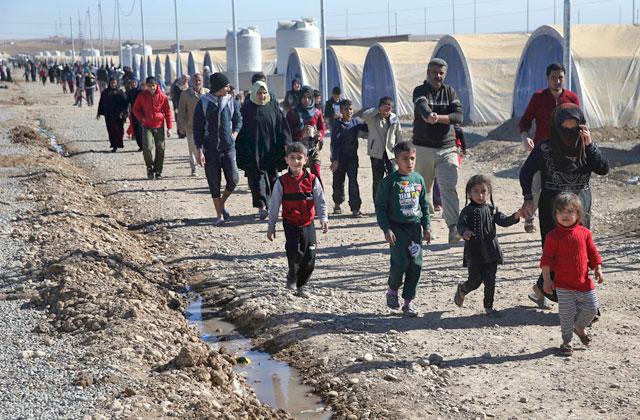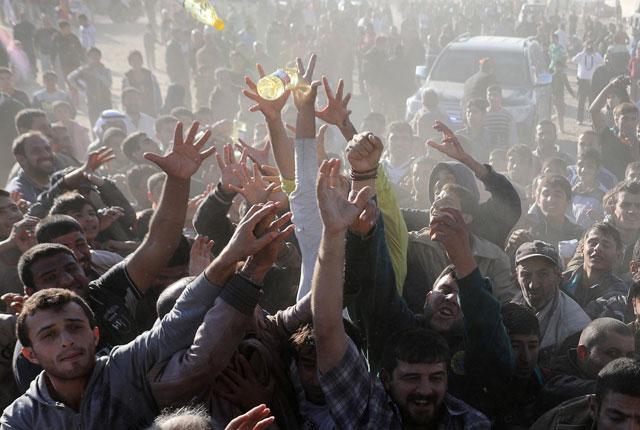You are here
Iraqi troops search for suicide car bombs in eastern Mosul
By AP - Nov 21,2016 - Last updated at Nov 21,2016

Iraqi citizens, who fled the fighting between Daesh militants and the Iraqi forces, walk inside a camp for internally displaced people in Khazer, east of Mosul, Iraq, on Monday (AP photo)
MOSUL — Iraqi troops fighting Daesh militants in the eastern outskirts of Mosul regrouped on Monday in neighbourhoods they recently retook from the extremist group, conducting house-to-house searches and looking for would-be suicide car bombs, a top Iraqi commander said.
Maj. Gen. Sami Al Aridi of the Iraqi military's special forces told The Associated Press that his men also foiled two attempted suicide car bombings earlier in the day, firing from a US-made tank on the approaching vehicles, which exploded before hitting their intended targets.
A civilian woman was wounded in the blasts, the commander said.
The Iraqi military launched a campaign on October 17 to retake Mosul, Iraq's second-largest city and the extremist group's last major urban bastion in the country. Most gains have been made by the special forces operating in the part of the city east of the Tigris River. Other forces are advancing on the city from different directions, and the US-led coalition is providing air strikes and other support.
But Monday's pause and the continuing danger to troops posed by suicide car bombs and sniper fire underline the difficulty of the campaign — even in eastern Mosul where Iraq's most combat-seasoned troops are operating. Weighing heavily on their battle plans is the safety of some 1 million civilians still residing in Mosul, a sprawling city cut in half by the Tigris.
The resilience of the Daesh militants and the reluctance of the Iraqi military and its Western backers to use overwhelming firepower — in order to avoid civilian casualties — have led to the slow pace of the battle to retake Mosul. More than a month since the operations started, the special forces remain some 10 kilometres from Mosul's city centre.
Meanwhile, Mosul residents reached by telephone inside the city and two special forces' officers said an air strike on Monday by the US-led coalition destroyed a major bridge over the Tigris in the southern part of the city.
It is the third of the city's five bridges on the Tigris to be targeted by the coalition. One was hit shortly before the offensive to retake Mosul began and the other soon after it started.
Targeting the bridges appears designed to limit Daesh’s capacity to reinforce or resupply fighters on the east bank of the Tigris where most of the fighting is taking place. The Iraqi military is known to have received US-made pontoon bridges designed for use in combat.
The residents spoke to the AP on condition of anonymity because they feared reprisals by the Daesh. The two officers insisted on anonymity because they were not authorised to speak to the media.
In Baghdad, Prime Minister Haider Al Abadi made an impassioned call for unity in an address to the nation on Monday. Accusing unnamed parties of seeking to raise the specter of sectarian strife, he said: “Our strength lies in our diversity... we have a tough task ahead of us to rebuild what Daesh destroyed.” Daesh is the Arabic acronym for IS.
“All Iraqis are first-class citizens,” he said.
The address came on the occasion of a major Shiite Muslim holiday, but it was not immediately clear why the prime minister would make a call for unity now.
The battle against Daesh, which is Sunni, has consistently been accompanied by sectarian undertones since Iraqi security forces and the military are predominantly Shiite.
Also, complaints by some Sunni Iraqis and international rights groups against alleged abuses by either the Shiite-led security forces or government-allied Shiite militias have fueled those undertones.
There are also rising tensions in the anti-Daesh battle between the Shiite militias and the Kurdish peshmerga forces from the semi-autonomous northern Kurdish region in Iraq.
Mosul was captured by Daesh in the summer of 2014 as part of a blitz that placed nearly a third of Iraq under the group’s control. Iraqi troops, federal police and allied Shiite and Sunni militias have over the past year pushed Daesh militants from most of the vast Sunni province of Anbar, west of Baghdad, and areas to the north and east of the Iraqi capital.
Also on Monday, three separate attacks in and around Baghdad killed at least five civilians and wounded 26, according to police and health officials who spoke on condition of anonymity because they were not authorised to talk to reporters.
Baghdad has for more than a decade experienced near daily attacks that have claimed thousands of lives. The attacks have mostly been blamed on Daesh, its forerunner Al Qaeda or extremist Shiite groups.
Related Articles
MOSUL — Iraqi troops on Sunday fortified their positions in Mosul neighbourhoods retaken from the Daesh terror group as their advance toward
Thousands of Iraqi troops and militiamen laid siege to jihadist fighters holed up in Tikrit on Thursday, wary of rushing into streets littered with bombs and infested with snipers.
BAGHDAD — Human Rights Watch (HRW) on Thursday accused Iranian-trained Iraqi paramilitary units battling the Daesh terror group of demolishi


















